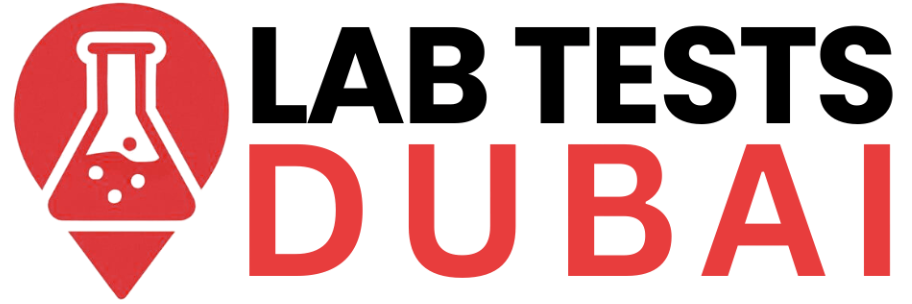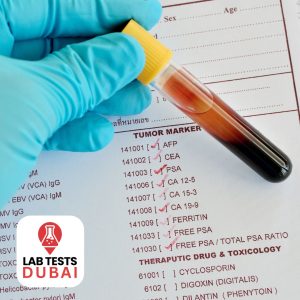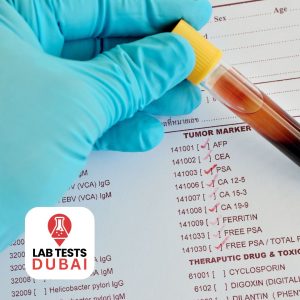
CA 19.9 Pancreatic Cancer Antigen Test – Early Detection Blood Test
260,00 د.إ
The Cancer Antigen (CA 19.9) – Pancreatic Test is a specialized blood test used to measure levels of CA 19.9, a tumor marker primarily associated with pancreatic cancer.
Sample Type : Serum
Methodology : Chemiluminescence
TAT : 2 Days
Description
CA 19.9 Pancreatic Cancer Antigen Test – Critical Tumor Marker for Pancreatic & Biliary Cancers
The CA 19.9 Test from Lab Tests Dubai is a vital blood-based tumor marker assay used to support the diagnosis, monitoring, and follow-up of pancreatic cancer, bile duct (cholangiocarcinoma), and other gastrointestinal malignancies.
CA 19.9 (Cancer Antigen 19.9) is a carbohydrate antigen produced by epithelial cells in the pancreas, bile ducts, and stomach. While not elevated in all individuals (especially non-secretors), it remains one of the most clinically useful biomarkers for:
- Monitoring treatment response in pancreatic cancer
- Detecting recurrence after surgery
- Assessing disease progression in advanced cases
Using high-sensitivity chemiluminescence technology, this serum-based test delivers accurate results within just 2 days, making it essential for:
- Patients with suspected pancreatic cancer
- Those undergoing chemotherapy or radiation
- Cancer survivors in remission surveillance
Available with home blood collection, Lab Tests Dubai ensures fast, accurate, and stress-free cancer monitoring—so you can stay ahead in your fight against one of the most challenging cancers.
Why You Need This Test
If you or a loved one are at risk for pancreatic or biliary cancer, this test could be critical in tracking disease activity.
You need the CA 19.9 Test if:
- You’re experiencing jaundice, abdominal pain, or unexplained weight loss
- You’ve been diagnosed with pancreatic or bile duct cancer
- You’re undergoing treatment (chemo, surgery, immunotherapy) and need response monitoring
- You’re in remission and require surveillance for recurrence
- You have a family history of pancreatic cancer or hereditary syndromes (e.g., BRCA2, Lynch)
- You have chronic pancreatitis—a risk factor for pancreatic cancer
While not a screening tool for healthy individuals, CA 19.9 is invaluable in clinical management—with rising levels often correlating with tumor burden, and falling levels indicating positive treatment response.
This test is not diagnostic alone—but a powerful ally in cancer care.
Symptoms That Indicate This Test
Consider the CA 19.9 Test if you or a loved one are experiencing:
✅ For Pancreatic Cancer:
- Jaundice (yellow skin/eyes, dark urine, pale stools)
- Persistent upper abdominal or back pain
- Unexplained weight loss
- Loss of appetite or early satiety
- New-onset diabetes (especially over 50)
- Nausea or vomiting
✅ For Bile Duct Cancer (Cholangiocarcinoma):
- Jaundice without gallstones
- Itching (pruritus)
- Fever (if infection present)
✅ For Cancer Survivors:
- Routine post-treatment monitoring
- Suspicion of recurrence or metastasis
These symptoms may indicate malignancy—and this test helps track disease activity when combined with imaging (CT, MRI, PET-CT).
Natural Production: How CA 19.9 Reflects Pancreatic & Biliary Health
CA 19.9 is a sialylated Lewis antigen (sLeᵃ) produced by:
- Pancreatic ductal adenocarcinoma cells
- Biliary tract epithelial cells
- Gastric, colon, and lung cancer cells (less commonly)
In healthy individuals, CA 19.9 levels are low or undetectable.
Elevated levels occur in:
- Pancreatic cancer (70–90% of cases)
- Cholangiocarcinoma
- Gallbladder cancer
- Colorectal, gastric, or ovarian cancers
- Benign conditions (e.g., pancreatitis, biliary obstruction, cirrhosis)
Normal Range:
- <37 U/mL (varies slightly by lab)
Interpretation:
- >37 U/mL → Elevated – warrants further investigation
- >100 U/mL → High likelihood of malignancy (especially with symptoms)
- Rising levels over time → Suggests progression or recurrence
- Falling levels → Indicates positive response to treatment
CA 19.9 is often paired with imaging and CA-125, CEA for comprehensive monitoring.
What Happens If Untreated or Unmonitored? Risks of Ignoring CA 19.9 Elevation
Ignoring rising CA 19.9 levels can lead to:
⚠️ Delayed Pancreatic Cancer Diagnosis – often asymptomatic until advanced
⚠️ Missed Recurrence – tumor grows undetected
⚠️ Metastasis – spread to liver, peritoneum, or lymph nodes
⚠️ Inoperable Disease – reducing survival chances
⚠️ Reduced Survival Rates – median survival for advanced pancreatic cancer is <1 year
The good news? With regular monitoring, recurrence can be caught early, allowing for:
- Timely chemotherapy
- Surgical resection (if localized)
- Improved quality of life
This test is a lifeline for high-risk and cancer survivors.
How to Prepare for the Test
To ensure accurate results:
✅ No fasting required
✅ Continue your regular medications—but inform your oncologist
✅ Avoid testing during acute infection or biliary obstruction (can cause false elevation)
✅ Inform your doctor if you have chronic pancreatitis or liver disease
A serum blood sample is collected via standard draw—available at our labs or via home collection.
Test Overview: High-Sensitivity Chemiluminescence Method
|
Test Name
|
Cancer Antigen 19.9 (CA 19.9) – Pancreatic Tumor Marker
|
|
Sample Type
|
Serum (Blood)
|
|
Methodology
|
Chemiluminescence Immunoassay (CLIA)
|
|
Turnaround Time (TAT)
|
2 Days
|
|
Category
|
Hormone/Tumor Marker / Oncology Diagnostics
|
|
Purpose
|
Monitor pancreatic, biliary, GI cancers; detect recurrence
|
|
Testing Location
|
Lab Tests Dubai – Accredited Labs & Home Collection Across UAE
|
Note:
- 5–10% of people (Lewis antigen negative) do not produce CA 19.9—levels remain low even with cancer
- Always interpret with imaging (CT/MRI), endoscopy, and clinical findings
Results are reported with reference range and clinical notes.
FAQs About the CA 19.9 Test
Q: Is CA 19.9 specific to pancreatic cancer?
A: It’s most associated with pancreatic cancer, but also elevated in bile duct, colon, and gastric cancers.
Q: Can benign conditions raise CA 19.9?
A: Yes. Pancreatitis, biliary obstruction, cirrhosis, and infections can cause elevation—always correlate with clinical context.
Q: Can I use this for cancer screening?
A: No. Not recommended for general screening—only for monitoring known or suspected cancer patients.
Q: Can I book without a doctor’s referral?
A: Yes! Lab Tests Dubai allows direct online booking—ideal for post-treatment follow-up.
Q: How will I get results?
A: A secure digital report is emailed within 48 hours, including CA 19.9 level and clinical interpretation.
Q: Is this test covered by insurance?
A: Yes. Tumor marker monitoring is medically necessary—covered by all UAE insurers for cancer patients.
If you’re at risk for or fighting pancreatic cancer, the CA 19.9 Test gives you the data you need in just 2 days—so you and your oncologist can track progress and act fast.





Reviews
There are no reviews yet.